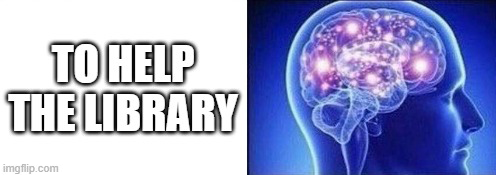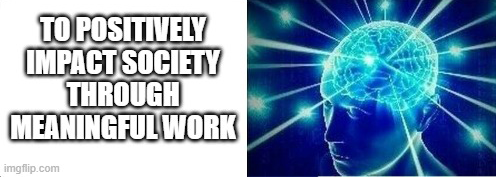Now let’s use our galaxy brain meme to relate the task to components of high-impact practices (HIP). This is ideally done collaboratively with your students, so each can synthesize their own personal meanings for the work they do. However, we also find it useful to come to these conversations with our own potential goals for what we hope students are getting out of the job.
Feedback

Our meme shows the thought process we want to encourage in our students. Our “framework for training” statement guides students to think about how what they’re doing helps the library. This gives them meaning when you provide performance feedback, helping them understand that they’re part of a team working toward shared goals. They aren’t just doing something because you told them to do it.
Integration, synthesis and application

Next, we want to encourage students to think of how their work can benefit them beyond their current student job. This is an example of integrating, synthesizing and applying knowledge in different settings. We can help spark this thought process by turning our “framework for training” statement into what we’re calling a “resume description” of a task, which a student could put on their resume or use in conversation with potential employers.
This “resume description” may look different for everyone, but we suggest using what you defined as a task’s knowledge, skills and purpose (criteria for success may get overly specific here, but feel free to use it, too, if it makes sense to you to do so). In our shelving example, this would look like:
This still looks clunky, so we’d encourage the student to think of a more natural way to say it. If the next job they hope to get isn’t in libraries, they may want to remove library-specific knowledge and skills. For example:
There’s lots of room to play with these “resume descriptions” of tasks to best suit your student’s needs. You can shorten them to bullet points:
You can help them build knowledge and skills sections to a resume by extracting those elements from the “framework for training” statement:
Special Knowledge: Library of Congress call numbers…
Key Skills: Attention to detail…
The whole point is to teach students to think about how to translate their library work to other settings for their benefit.
Connection

Our galaxy brain reaches its most self-actualized state when we get students thinking about how their work benefits not just themselves, but their broader community. We’re calling this a task’s “deeper meaning” and not every task may have one. Several tasks may all share the same deeper meaning.
To help get students thinking this way, you can start with questioning a task’s purpose. For our shelving example:
Talk it through with them. Think about what makes the purpose important to people other than you or your students performing the task. Break the idea into smaller pieces if you want.
Why do people need books? One reason could be to use in writing a paper for a class.
Why is it important to find books when they’re needed? If that book is being used in paper, that means there’s probably a deadline for the assignment. If a book is mis-shelved, options to get that person a different copy may take more time, and might not make their assignment deadline.
The idea of a student’s broader community can range from their peers to everyone at their school and beyond. What’s important is that this conversation gets students thinking outside of themselves, moving toward a bigger picture of the purpose.
Shelving in relation to peers: because I pay attention to detail and learned the Library of Congress call number system, I’m helping make sure my friends and classmates can finish their assignments on time.
Bigger picture: my work helps people at my school achieve their academic goals.
Bonus! Interaction, Time and Effort
While not directly represented in our metacognitive meme, you may have noticed that these conversations with students sound a lot like mentoring and could take considerable time and effort from everyone involved. These are two more HIP components that ultimately contribute to the success of the student in both their library work and life.
From KnowYourMeme.com:
"Galaxy Brain, also known as Expanding Brain, is a multi-panel exploitable image series comparing the brain size of a person relative to other variables."
A HIP component. Transparent design helps students feel “in on” the learning process, which can empower them to ask questions along the way; they know we’re trying to help them achieve a goal, so feedback is natural. See High-Impact Practices - Formal and informal feedback.
A HIP component. Transparent design helps us identify these skills and convey them to students in a way that fosters deeper meaning from the work. See High-Impact Practices - Integration, synthesis and application.
A HIP component. Transparent design guides us toward this mind-frame, encouraging “big picture” thinking. See High-Impact Practices - Connection.
From Merriam Webster:
"to realize fully one's potential"
A HIP component. Supervisors can act as mentors to students. See High-Impact Practices - Faculty and peer interaction.
A HIP component. "Considerable" time and effort should be devoted to tasks. See High-Impact Practices - Time and effort.
Metacognition is thinking about how you're thinking. See High Impact Practices - Metacognition.
